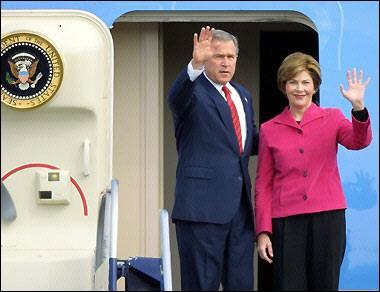Poor Latin America! So far from God, so close to the United States
 George W. Bush preached for more free trade at a summit with Latin American leaders in Monterrey, Mexico.
George W. Bush preached for more free trade at a summit with Latin American leaders in Monterrey, Mexico.

When the former Mexican dictator Porfirio Diaz said a century ago: “Poor Mexico! So far from God, and so close to the United States”, he did not know that he would speak for the whole Latin America 100 years later. Despite the countless natural resources of the region, more than 40% of its population –around 200 million souls- lives in poverty. Moreover, Latin America is the most unequal region of the world, according to an United Nations recent research.
The crisis deepened in the nineties, as the region adopted –without discussions- a pro-market program masterminded by US think-tanks called “Washington Consensus”. Even though it proved to be unsuccessful to drive people out from poverty, Bush argued this week, at the OAS presidential summit in Monterrey, Mexico, that the best road to prosperity in the hemisphere is to remove trade restrictions.
Despite Bush’s excited oratory, leaders from Latin America and Canada remain unconvinced about the “market paradise” offered by Washington. Moreover, Latin leaders, as Argentina's Kirchner fiercely criticized free market policies and, specifically, IMF behavior during the nineties. Kirchner went further: the Argentine president asked for a “Marshall Plan” for Latin America, including cuts to its foreign debt. He said: “We need America to look America”.
Although they still have broad disagreements, leaders at the 34-nation Summit of the Americas –excluding Cuba- are working hard to demonstrate that relations are improving, pledging to strengthen democracy and fight terrorism in the region.
The most visible example of that diplomatic outreach came when President Bush invited Mexican President Vicente Fox to visit his Texas ranch. Fox accepted and praised Bush's new immigration proposal, which would allow some foreign workers to live temporarily in the United States.
However, US ties with Venezuela are far from being normal. President Hugo Chavez denounced at the meeting that Washington was plotting to oust him, by supporting internal opposition. Chavez remained far from Bush all along the summit and played grimaces during his speech.
Usually Chavez attracts the attention of journalists and officials. This time he used his charismatic oratory to go against the IMF and to claim for a coastline for the landlocked South American State of Bolivia. “Have you seen the images from Mars?”, he asked reporters, “well, they say the IMF was there before the spacecraft arrived”, answered himself.
Chavez also defended from an accusation from the US State department, which said that his administration was behind a plot to oust pro-US governments in South America. Some US officials believe Chavez financed leftist Bolivian leader Evo Morales to oust conservative president Gonzalo Sanchez de Lozada last October. “I want probes of that. It’s absolutely false”, protested Chavez to an Argentine radio.
Canadian Prime Minister Paul Martin, who intended to use the summit partly to improve relations with Washington, criticized his southern neighbor's economic policies, saying developing countries cannot immediately compete in the cutthroat global economy.
He said even the United States and other rich nations once "asked for time to adjust" to changing economies through agricultural subsidies and other supports. Martin added that the time for those nations to eliminate such programs "is long past due."
Peruvian President Alejandro Toledo criticized U.S. officials for refusing to lower agricultural subsidies while asking poor nations "to play ball in the free trade court." Paraguay's president, Nicanor Duarte, called for "Americas for all people, not for a few." Chilean President Ricardo Lagos said: "This isn't the poorest continent, but it is perhaps one of the most unfair."
Hernan Etchaleco
Pravda.Ru
Subscribe to Pravda.Ru Telegram channel, Facebook, RSS!


